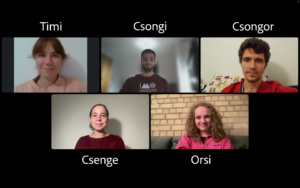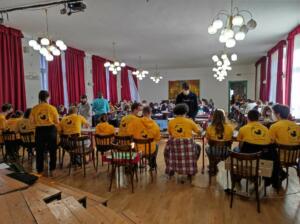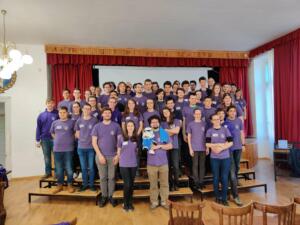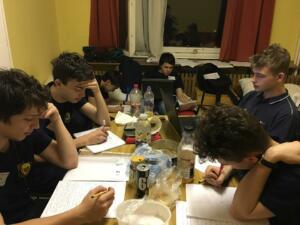International organisers

Timi has been an organiser since her first year of university, being the main organiser of the maths competitions for two years before continuing her studies abroad. Now (even alongside her full-time job) she is leading the international competition for the sixth time. In her free time she enjoys sports, spending time outdoors, singing and obviously doing maths.
Csongor is helping organize the international competition for the third year, since he lives abroad, but overall this is his sixth year as an organizer. Earlier he was responsible for category C while studying math at university. In his rare free time, next to his PhD studies, he likes spending his time doing a wide variety of sports like orienteering, volleyball or just spending time outdoors.
Csenge was an organiser of the international competition last year as well, and it is her fifth year organising overall. Apart from being a member of the international team, she is also responsible for communicating with the students in the Hungarian competition. When she is not doing mathematics, she likes spending her time dancing, singing, or eating.
Orsi is one of the latest additions to our ever-growing international organizing team. She was one of the main organizers last year, but with her studies taking her abroad, she’s passed the baton and now helps with the international competition. She’s passionate about teaching talented students, and in her (rare) free time, you’ll find her exploring nature or hanging out with her dog, Málna.
Csongi is a new face (but not a new name) in our growing international organising team. He has been helping the Dürer competition for almost 5 years by proposing several problems each year, and before joining us, he was responsible for the relay round of the final. He has been studying abroad for 4 years and just started his PhD. When looking for a break from his research, he usually rows or plays board games.
Hungarian organisers
The organising team traditionally consists of young people, mostly university students studying maths. This dates back to the early years of the competition, and ever since then, we can regularly welcome former competitors as new organisers. The success of the competition depends on this community, consisting of 30 to 70 people. Some of them have been organisers for 10 years already (and still take part enthusiastically, even alongside a full-time job) and some of them take important responsibilities as first-year undergraduates already.



History
Plenty of mathematics contests are traditionally held in Hungary. From primary schoolers to university students, everybody can find a contest that fits their age and qualifications. These are mostly individual contests where the participants sit down in a room for a few hours, working on the problems quietly. However at the Dürer Competition, there are teams of 3 taking part. For the duration of the contest each team works together to solve the problems, so the contestants can experience the benefits of cooperative thinking. Our experience shows that the majority of students are happier and more relaxed than during an individual contest.
It is a very important goal for us to set interesting problems to show the beauty of mathematics and the joy of thinking to lots of students. We also wish to include as many original problems as possible. In each year, about 150 problems appear on the contest — of course not all can be original, but we invent most of the harder problems on our own.
